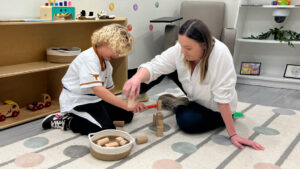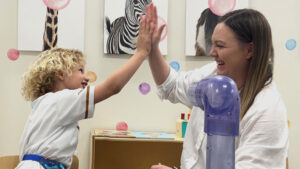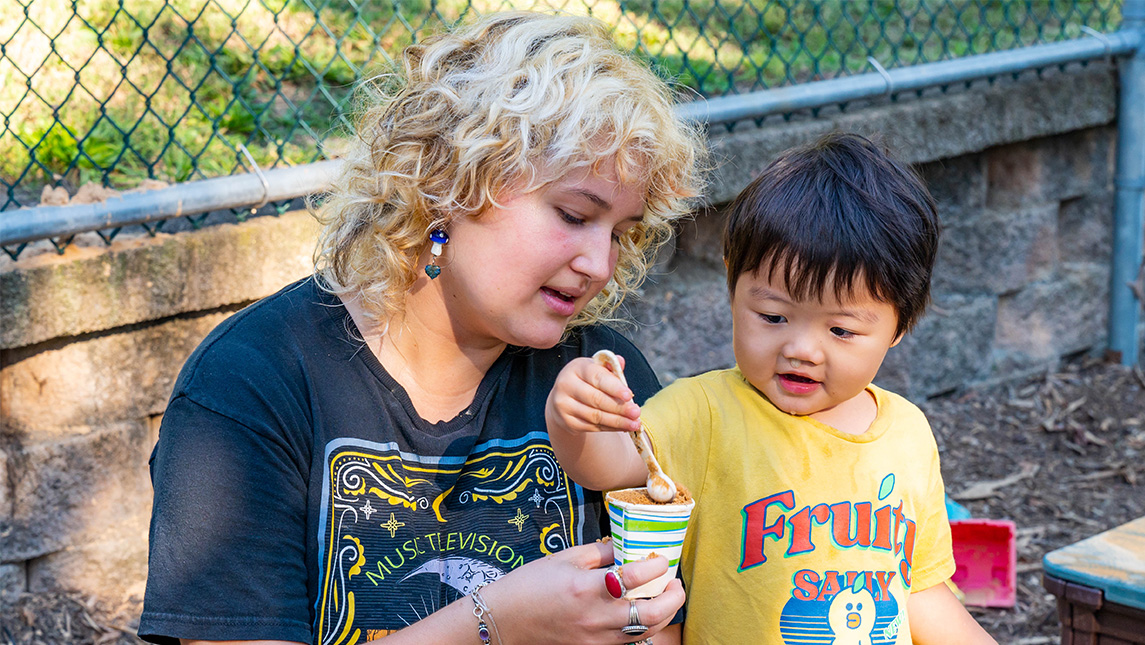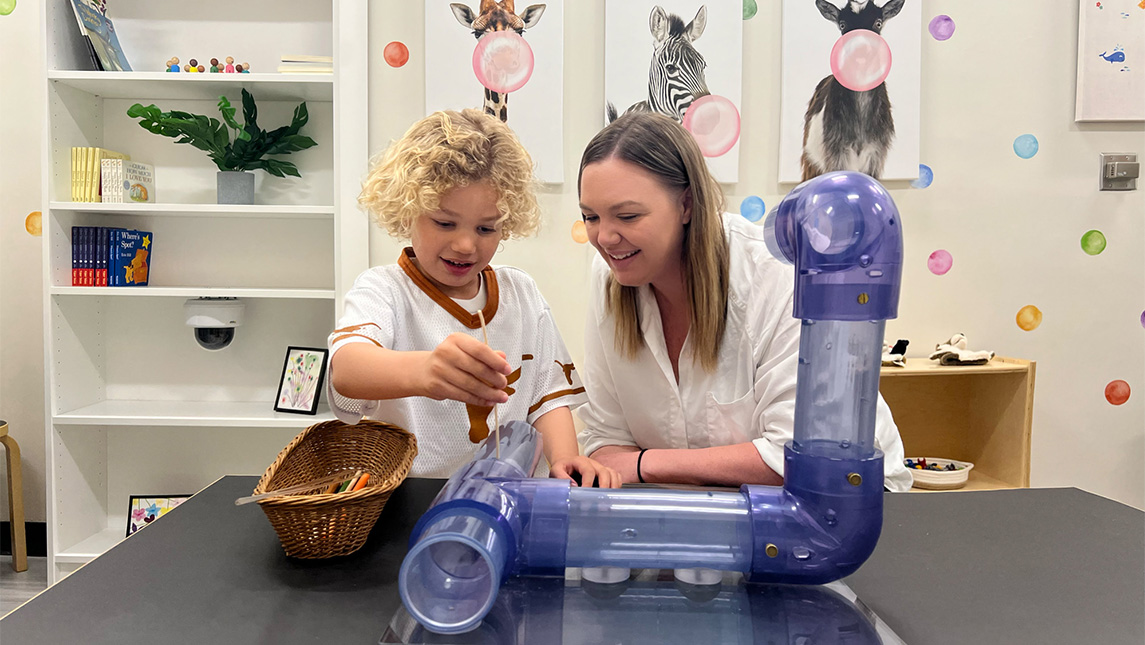“The greatest job to me is to be able to be curious about something and to pursue it,” says Dr. Nicole Perry ’13, ’16.
That curiosity is what led her to research children’s emotional control. It’s what attracted her to the work that UNC Greensboro’s research professors were doing in Human Development and Family Studies (HDFS).
“I see kids interact all the time,” she says. “I have my own children. It’s such a great privilege to be able to think about these things in complex ways. And then really try to understand why and how something works that way.”
Developmental scientists like Perry – now an assistant professor at the University of Texas at Austin – are learning about a critical timeframe in which children develop emotion regulation and how it impacts the rest of their life.
BODIES AND EMOTIONS IN TANDEM
The average parent, teacher, or childcare worker may not think in terms of “inhibitory control” or “behavioral synchrony” like Perry, but they know firsthand how a child’s self-control – or lack of – affects them and the people around them. They have some understanding of how children emulate their parents, guardians, and caretakers.

“Children encounter frustrating situations all the time,” says Perry. “A challenging problem-solving task in the classroom, wanting to keep playing when it’s time to clean up, or another child taking a toy or refusing to share. I need to figure out how they develop the ability to control their behavior and arousal during those times.”
Her latest research explores how young children’s emotions, behavior, and physiology become synchronized with their teachers’.
Her husband and kids helped her decorate her lab in Austin like a preschool classroom. “We put the stickers on the wall, hung paintings, put the toys up. I want kids to walk into an environment that is comfortable, warm and inviting.”
Her child and adult subjects put on ECG stickers that measure their heart rates while they interact. This gives her a measurement of physiological arousal and control.
Perry believes that synchronous teacher-child relationships may help children develop a greater ability to manage their emotions, especially within the classroom setting.
“Self-regulation is a broad topic,” Perry explains. “My research largely focuses on emotion regulation, but there’s some cognitive regulation in there too.”
SEEKING OUT THE EXPERTS
It was the research of UNCG professor Dr. Susan Calkins, now professor emerita of HDFS, that inspired Perry to come to the Graduate School, first to get her master of science in human development and family studies in 2013 and then continue on to her doctoral degree in 2016.
“Susan is a force to be reckoned with,” says Perry. “Her work stands out within that body of literature.”
Calkins saw in Perry the skills necessary to venture out on her own. “I consider her to be one of my top students from our Ph.D. program,” she says. “We’re trying to train the next generation of scholars. The expectation for a faculty member is not only that you teach courses, but that you conduct your own research.”
That means committing to a competitive career track – not just for jobs but also when securing research funding. Calkins was impressed by the ways that Perry wanted to build upon her own research, by delving deeper into parents’ influence on children’s development and the psycho-physiological measurement methods.
“It’s a tough environment to be in, but she’s well-prepared for it,” says Calkins. “Nicole was very good at generating her own ideas while being willing to accept feedback and think through the questions I would raise about where she was headed, what she wanted to do, and why she did things a certain way.”
THE WORLD IS HER LAB
Perry’s favorite place to be is in the lab. During the COVID-19 pandemic, she sent kits to families in Minnesota and had mothers and children collect their own hair samples. Perry measured the levels of cortisol, a stress hormone, in the hair to see how the new and unique stresses felt by mothers trickled down to the children.
“A mother’s biological stress response predicted her children’s biological stress response,” she found. “And this was moderated by age. For younger children, the correlation or the association between the two was stronger. Which makes sense given that younger children rely heavily on parents.”

She also studied the behavior of older children who were institutionalized as infants and toddlers. Previous work in this area showed that the cortisol stress response in the children was blunted – likely due to deprivation during their early childhood – but began to rapidly increase during puberty. It appeared that the body was attempting to recalibrate.
Perry questioned how that recalibration would impact their mental and behavioral health.
The results surprised her, Perry says. “Here’s evidence that recalibration may actually be associated with more internalizing symptoms, like anxiety and depression. These findings may be alluding to the possibility that the body isn’t equipped to handle this influx of cortisol after functioning with lower levels the whole time.”
It’s observations like those that could be a critical takeaway in future scientific literature and lead to new support methods for children who deal with the disadvantages of early deprivation.
REAL WORLD IMPACT, PERSONAL FULFILLMENT
Her research earned her the 2022 Victoria S. Levin Award from the Society for Research and Child Development. The award supports burgeoning researchers and offers financial support for future grant work.
“It’s so incredible,” says Perry. “I’m following an amazing group of people who’ve received this award in the past. It’s an honor sitting on the shoulders of the very prominent research scientists that came before me.”
The perk of being a researcher for Perry is the opportunity to change the world for the better, while having fun at the same time.
“I, of course, hope that my work influences policy to make children’s lives better. That is the goal of research, to make children’s lives better. And personally, in my day to day, I love the research aspect of it, the curiosity, and tackling the unknown. It makes work fun every day. And it’s never the same day twice.”
Story by Janet Imrick, University Communications
Photography courtesy of Dr. Nicole Perry

Mold healthier minds, bodies, and spirits



